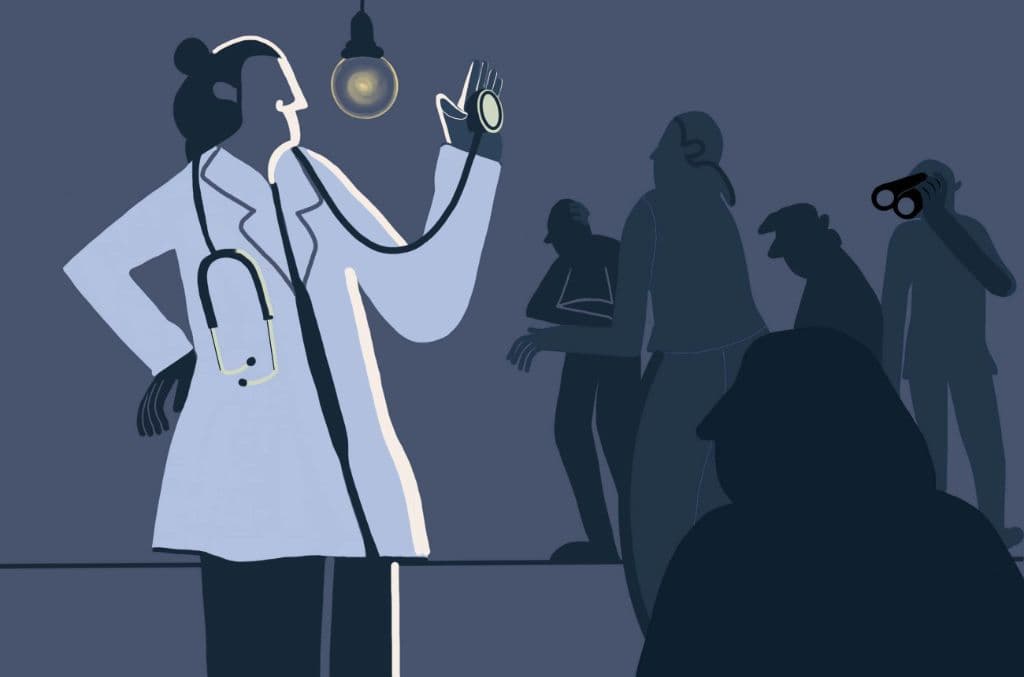This above title speaks volumes about the experiences of female doctors in relation to the medical field, patients and public in general. We’re used to seeing women as nurses, quietly handing medical instruments to the important male doctors conducting the crucial surgery on our TV screens. This is the same understanding that many project onto medical healthcare professionals in our real lives. This is a grave stereotype that needs to be challenged as soon as it is performed.
The main problem at hand is that the prevailing social hierarchy and culture - has seeped its way into the institution of medicine as well. The medical industry is notorious for being extremely hierarchical, particularly in variables of age, gender and race. Young women of colour in this industry therefore, face numerous hurdles in their journeys as opposed to their male counterparts.
Women were first permitted into the medical field to provide a more ‘nurturing’ and holistic presence to patients and were therefore working majorly in ‘female’ centric fields of paediatrics, psychiatry, dermatology, medical genetics and pathology, and were underrepresented in surgical branches with the exception of obstetrics and gynaecology where women outnumber men, at 57%. In a webinar on the challenges women surgeons face that is available on Youtube, Dr. Jayaypriya, a consultant surgical gastroenterologist ( DNB, MRCS, FMAS) from Chennai, affirms this situation with her own experiences as a female surgeon, where patients and colleagues she has worked with are surprised that female doctors in general are capable of conducting surgeries on parts of the body that are not just related to the female reproductive system.
A justification often used for their exclusion is that women cannot cope with the many demands a life in medicine brings, due to their ‘delicate’ nature or inability to handle such a physically and mentally demanding role. The process of becoming a doctor is gruelling irrespective of gender. 10-14 years of your life goes in your education and training before you become a licensed doctor. This timeline is particularly mind boggling when we look at it from the perspective of a female doctor. In India, one’s medical graduation, post graduation, senior residency and junior years as faculty directly coincide with marriage, childbearing and child rearing years.
Doctors then are no strangers to physical, mental and social stressors- all of which impact their own personal health and well-being that they often push/neglect in order to make sure their patients are healthy. It is hard to imagine the experiences of a female doctor particularly when she has to work long shifts whilst on her period, when she’s pregnant or is going through other stressful changes in relation to her sexual and reproductive health. Stress, burnout, exhaustion from physically and mentally demanding roles, the pressures and emotional impact of being responsible for another human’s life,etc all go unnoticed when we look at our doctors’ faces during our check-ups. However, this in no means can be used to justify the exclusion of women, but instead can be used as grounds to honour and appreciate their resilience, hardwork and strength even more.
In the midst of all of this chaos, female doctors have additional odds stacked against their favour. In my research, I was shocked to discover the following situations that unfortunately are viewed as common knowledge amongst those in the field
Firstly, a prevailing wage gap. Numerous studies have shown that female doctors are significantly paid less. This divide is further exacerbated when it comes to discrimination on the basis of shift allocations, hiring and maternity leave. Dr. Jayapriya chimes in on this matter as well. In her experience, during a pre-employment health check up, it was discovered that a simultaneous pregnancy test was also conducted without her knowledge or consent. This it turns out, was a routine practice, and the women found pregnant were immediately not hired. In addition to this, certain employers choose to hire more women than men because they know that they will work for lesser compensation. Male colleagues are also given better operating schedules, women are deterred from being hired because of a prevailing misconception that they will only be able to work part time or be the cause of increased turnover due to societal obligations of getting married and starting a family.
Secondly, it has been noticed that female doctors are also on the short end of the stick when it comes to being considered for promotions or recognition i.e. in medical society awards as opposed to their male counterparts. It is also rare for one to see many women in leadership positions. The discrimination is institutional where women account for only 18% of hospital CEOs and 16% of all deans and department chairs in the U.S. Women are also in the minority when it comes to senior authorship (10%) and Editors-In-Chief (7%) at prestigious medical journals. Being a female superior in a male dominated field often results in disrespect and arrogance shown by male subordinates who find it degrading to follow the orders and instructions given by a woman.
This gender inequality is something women are exposed to from the very first step in their medical careers- their choice in what education path to follow. Women make up only 28% of the workforce in science, technology, engineering and math (STEM), and men vastly outnumber women majoring in most STEM fields in college. Here, streams of education are also gendered where subjects such as mathematics, physics and chemistry are considered to cater to the ‘masculine’ mind rather than the feminine. In India, although the profession of medicine is highly coveted and parents push for their daughters to study and become doctors- the woman is always reminded of her gender in relation to the costs invested in her education and whether she’d be ‘allowed’ to work despite acquiring her degree post marriage and if it is so , the field in which she chooses to enter must also be in line with her gender as is seen in the increased prevalence of women in the fields mentioned at the start of this article.
The issue regarding maternity leave is also simple- female doctors are either not hired prematurely stating that they will ask for maternity leaves soon, or they are given either unpaid leave or a shorter duration of time for leave. There are legal guidelines like the Maternity Benefit Act (1961) that are set in place to empower female doctors in these situations, but again what is legally required is often not practiced and this discrimination can certainly be continued in subtler, implicit forms.
The conversation on maternity leave brings us to a crucial struggle a female doctor may experience. The balance between ‘Work and Family’. Dr. Jayapriya succinctly shares the advice she once received from a superior stating that, “You will only become successful as a female surgeon, if you are single, painfully married or divorced”.
This statement sheds light on the conflict many female doctors go through when they have to balance their work and family life. Despite having full time jobs, female doctors also share a higher responsibility in taking care of household duties as well. Furthermore, these doctors are also susceptible to immense emotional turmoil and conflict when they are at work and unable to be present in their children’s lives and also when at home and feeling inefficient at her job as well. This reveals the intense amount of guilt, shame and sacrifice female physicians experience as a norm when it comes to striking a balance. Societal pressures of getting married, procreating and child rearing that are often demarcated as the sole role of women which adds to the pressure. In this, they often forget to pay attention or cater to their personal needs- needs that are separate from being an efficient doctor, mothers and partners.
At the end of her talk, Dr. Jayapriya offers a solution, not many can find, but one that would help lighten the burden- of the importance of a supportive partner. In a Queer Eye episode (popular reality show available on Netflix) an episode is dedicated to the emotional journey of a young woman of colour- Dr. Lilly Yi, who is about to start her first job as a licensed medical practitioner. The episode reveals her struggles in balancing the demands of her years in education and work as well as her limited presence in the life of her young daughter. In this situation, her husband is key in raising their child and taking care of the household until both of them come to an equilibrium in their roles as working class parents and partners. I would recommend watching this beautiful episode as it raises awareness regarding the struggles and strength shown by these amazing female doctors all over the world. Apart from her home- work life, one of the key areas in which Dr. Yi struggles in, is to present herself as a legitimate and efficient doctor who is taken seriously by her colleagues and patients. It is often her race, gender and physical framework that has led to unpleasant interactions that have caused her to be insecure in her own capabilities. This is a struggle many women of colour of similar professions have resonated with, and it is this journey in self-exploration and self-confidence that empowers Dr. Yi to be a proud female doctor today.
In conclusion, I hope this article reaches as many doctors as possible - who after reading and connecting their own experiences, observation and behaviours towards female colleagues, are now more mindful of their struggles and pains, and will do their best to respect and accommodate all the female healthcare employees they meet in their daily work.
I hope this reaches students aspiring to become doctors, of the realities of this situation. Hopefully this knowledge prepares , aids and sensitizes you in your future experiences.
And I hope this serves as a source of validation and acknowledgement to all the female doctors reading that your struggles are real and your determination and resilience shines through your hard work and efforts both at the workplace and at home. Thank you for your service.
Disclaimer : This information is provided for educational purposes and should not be construed as medical advice. Please consult with your healthcare practitioners before undertaking any changes in your diet or adding supplements.
ProactiveForHer is a digital clinic for women, offering accessible, personalized, and confidential health-care solutions. We offer products and services for out-patient health concerns of Indian women, across their lifetime - from puberty to pregnancy to menopause. To know more on the sexual and reproductive health of women, visit https://www.proactiveforher.com/ : This information is provided for educational purposes and should not be construed as medical advice. Please consult with your healthcare practitioners before undertaking any changes in your diet or adding supplements.
ProactiveForHer is a digital clinic for women, offering accessible, personalized, and confidential health-care solutions. We offer products and services for out-patient health concerns of Indian women, across their lifetime - from puberty to pregnancy to menopause. To know more on the sexual and reproductive health of women, visit https://www.proactiveforher.com/

